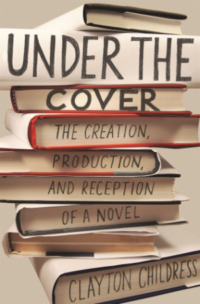Under the Cover: The Creation, Production, and Reception of a Novel

Under the Cover: The Creation, Production, and Reception of a Novel. Clayton Childress. Princeton: Princeton University Press, 2017.
In Under the Cover, Childress examines the novel as a sociological cultural object with attention to three aspects: creation (art), production (commerce), and reception (meaning). Adopting field theory, Childress examines those group of people who orient their attention toward each other and similar issues that are specific to the field in which they belong. The fields of creation, production, and reception of the novel are distinct from each other but also interdependent in the existence of the novel. Using Cornelia Nixon’s novel, Jarrettsville, Childress shows how an examination of these different fields provide a fuller picture of how a novel is created and received in the public.
For the field of creation, Childress interviews Nixon about her experience writing Jarrettsville. He describes how Nixon drew from her personal experiences; the research she conducted; the feedback and encouragement she received from her colleagues, family, and friends; and how the novel got its name. Childress also writes about how novelists handle their finances with an elite making most of the money and the rest having to find ways to support themselves (an advance of $6,000 is considered by writers a stable, middle-class income).
From creation to production, literary agents are crucial to seeing a novel published. Literary agents build their professional reputation and income on the books and authors they represent. Agents make their decisions on a book’s artistic ability, market feasibility, and own personal tastes, interests and experiences. Unfortunately, the profession is overwhelming white (94), male, and live in New York, making it difficult for women and people of color to be published.
In the field of production, book editors and literary agents work together in the publication of a novel. Like literary agents, book editors also make their decisions on the book’s artistic ability, market feasibility, and personal judgment, along with the factor of whether the book is a good fit with the publisher (i.e., whether the book fits the brand of the press). Publishers also make decisions on books as to how to categorize them (e.g., commercial, artistic) and balance long-term and short-terms interests (art and commerce). These decisions are made today in the context of conglomerate presses that often have concerns entirely outside of publishing. Childress concludes this section with an examination of the processes of copy-editing process, marketing, and the actual print run of the book.
From production to reception, Childress looks at book conventions, field representatives, and book sellers, such as chain, independent stores, and Amazon. In the reception of the novel, Childress shows the discrepancy between what the author Nixon intended and what readers and critics thought of the book. Those who liked the novel interpreted more according to the author’s intentions and those who disliked had a different understanding of the novel. There also was a divided between North and South in the interpretation of Jarrettsville. Other issues, like race, gender, and relationships are also explored in how Jarrettsville was received by the public.
Childress concludes with the observation that fields are semi-autonomous with people and concerns localized in one field but interdependent upon others. By examining how Jarrettsville was created, produced, and received, Childress takes us behind the scenes to show how culture is made from beginning to end. Covering all aspects of the life of the book, Under the Cover is ground-breaking in its study of the novel and should be required reading for those interested in how books, and more broadly culture, is created.




